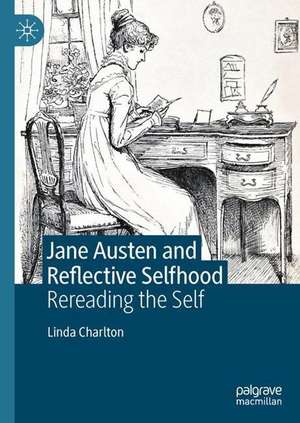Jane Austen and Reflective Selfhood: Rereading the Self
Autor Linda Charltonen Limba Engleză Hardback – noi 2022
| Toate formatele și edițiile | Preț | Express |
|---|---|---|
| Paperback (1) | 779.08 lei 6-8 săpt. | |
| Springer International Publishing – 2 noi 2023 | 779.08 lei 6-8 săpt. | |
| Hardback (1) | 783.20 lei 6-8 săpt. | |
| Springer International Publishing – noi 2022 | 783.20 lei 6-8 săpt. |
Preț: 783.20 lei
Preț vechi: 955.11 lei
-18% Nou
Puncte Express: 1175
Preț estimativ în valută:
149.90€ • 155.89$ • 125.43£
149.90€ • 155.89$ • 125.43£
Carte tipărită la comandă
Livrare economică 15-29 martie
Preluare comenzi: 021 569.72.76
Specificații
ISBN-13: 9783031121593
ISBN-10: 3031121597
Pagini: 259
Ilustrații: XI, 259 p. 1 illus.
Dimensiuni: 148 x 210 mm
Greutate: 0.48 kg
Ediția:1st ed. 2022
Editura: Springer International Publishing
Colecția Palgrave Macmillan
Locul publicării:Cham, Switzerland
ISBN-10: 3031121597
Pagini: 259
Ilustrații: XI, 259 p. 1 illus.
Dimensiuni: 148 x 210 mm
Greutate: 0.48 kg
Ediția:1st ed. 2022
Editura: Springer International Publishing
Colecția Palgrave Macmillan
Locul publicării:Cham, Switzerland
Cuprins
Introduction: Selfhood and the Novel.- Chapter One: Memory: Continuity, Coherence and Self-construction.- Chapter Two: Imagination and the Creative Self: The Reader and the Writer.- Chapter Three: Proofs, Probabilities and Ambiguities.- Chapter Four: Sympathy: The Self and Society.- Chapter Five: The Reflecting Self: Self-examination and Moral Judgement.- Chapter Six: Reflection, Reading Practice and Self-formation.- Conclusion.
Notă biografică
Dr. Linda Charlton returned to research after a career spanning the UK’s education, health and civil services. This is her first book. She is currently working on her second.
Textul de pe ultima copertă
“Jane Austen and Reflective Selfhood is a multi-layered and nuanced analysis that locates Austen within the Enlightenment philosophical tradition shaped by the work of Locke, Hume, and Smith. In a perceptive and timely study, Linda Charlton explores a range of topics – memory, imagination, probability, sympathy, reflection and reading – to argue that Austen’s use of moral-sense philosophy is foundational to her own style of fiction. The book benefits from Charlton’s meticulous attention to detail and careful research, remaining eminently readable and impeccably argued throughout.”
-- Anthony Mandal, Professor of Print and Digital Cultures, Cardiff University, Wales.
This book makes connections between selfhood, reading practice and moral judgment which propose fresh insights into Austen’s narrative style and offer new ways of reading her work. It grounds her writing in the Enlightenment philosophy of selfhood, exploring how Austen takes five major components of selfhood theory—memory, imagination, probability, sympathy and reflection—and investigates their relation to self-formation and moral judgement. At the same time, Austen’s narrative style breaks new ground in the representation of consciousness and engages directly with contemporary concerns about reading practice. Drawing analogies between reading text and reading character, the book argues that Austen’s rendering of reading and rereading as both reflective and constitutive acts demonstrates their capacity to enable self-recognition and self-formation. It shows how Austen raises questions about the potential for different readings and, in so doing, challenges her readers to reflect on and reread their own interactions with her texts.
Dr. Linda Charlton returned to research after a career spanning the UK’s education, health and civil services. This is her first book. She is currently working on her second.
-- Anthony Mandal, Professor of Print and Digital Cultures, Cardiff University, Wales.
This book makes connections between selfhood, reading practice and moral judgment which propose fresh insights into Austen’s narrative style and offer new ways of reading her work. It grounds her writing in the Enlightenment philosophy of selfhood, exploring how Austen takes five major components of selfhood theory—memory, imagination, probability, sympathy and reflection—and investigates their relation to self-formation and moral judgement. At the same time, Austen’s narrative style breaks new ground in the representation of consciousness and engages directly with contemporary concerns about reading practice. Drawing analogies between reading text and reading character, the book argues that Austen’s rendering of reading and rereading as both reflective and constitutive acts demonstrates their capacity to enable self-recognition and self-formation. It shows how Austen raises questions about the potential for different readings and, in so doing, challenges her readers to reflect on and reread their own interactions with her texts.
Dr. Linda Charlton returned to research after a career spanning the UK’s education, health and civil services. This is her first book. She is currently working on her second.
Caracteristici
Grounds Austen's writing in the Enlightenment philosophy of selfhood Proposes fresh insights into Austen's narrative style Explores Austen's direct engagement with contemporary concerns about reading practice
